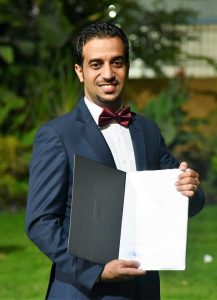The obstacles were enormous, but despite the conflicts in Yemen, in 2016, Tariq Mohey Al-Dein was able to obtain the necessary visas to study in Germany and Egypt. As a DAAD scholarship holder, he completed the EPOS programme’s “International Education Management – INEMA”, a joint course between the Ludwigsburg University of Education and Helwan University in Cairo.
 Why was it so difficult to get the visas?
Why was it so difficult to get the visas?
I had to travel to Jordan because the German embassy in my home country Yemen was closed. But in Amman I only got a visa for the first phase of my studies. The second visa was issued by the German Embassy in Cairo – luckily for the remainder of my studies.
There’s a war going on in Yemen. What did that mean for your travels?
The journeys were expensive and dangerous. For all attendance phases of the INEMA Program, I had to travel a whole day by bus to Aden OR Sayoun city because the airport in my hometown Sana’a was closed. We drove through war zones and passed many armed checkpoints. Then I had to discuss the validity of my passport with the airport security because it was issued in occupied Sana’a. This often prevents travelling. Even if it is possible to get to the airport, it is not clear that you will really reach your destination.
Proposed solutions for education management
You made it! In October 2016, you came to Ludwigsburg on a DAAD scholarship, and in February 2018, you completed the Master’s programme in Cairo. What was most important to you during this time?
These years mean a lot to me. They enriched my life and enabled me to gain valuable experience. I got to know students from different countries and cultures. Above all, the studies themselves were important to me. I want to work towards a better future in Yemen, and in Ludwigsburg and Cairo I learned a lot about how to accomplish this.
What did you write your Master’s thesis on?
In my thesis, I examined education management in Yemen during the war and what has happened in the education’s public sector in recent years. Among other research, I spoke with education experts to analyse the situation. On the basis of this data, I was able to develop proposals for solutions.
Commitment to people in need
What are you doing now?
Yemen is experiencing the biggest humanitarian crisis caused by people. Numerous non-governmental organisations are trying to help there. I had already worked for one of them before earning my Master’s degree. Since May 2018, I have been working in Sana’a for “Handicap International”, an organisation that cares for war victims and people with disabilities. I believe that I was able to get this job thanks to the qualifications I earned through INEMA.
What are your plans for the future?
I’m planning to earn my doctorate in Germany, and after that I will return to serve and help in building up my country. 75 per cent of the population – around 22 million people – rely on humanitarian aid; half of them are at imminent risk of death. All areas of life are affected by the war: health, the economy, nutrition, tourism and, of course, education. It will probably take decades to reach anything close to a normal standard of living again. What we absolutely need now is peace.





